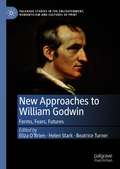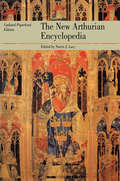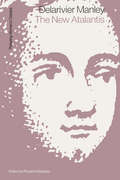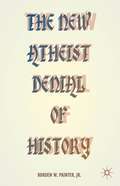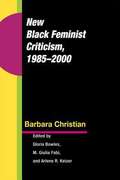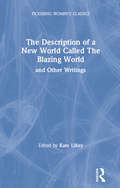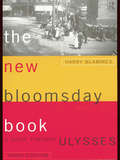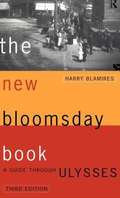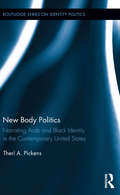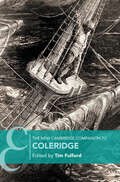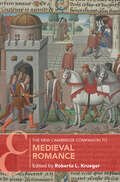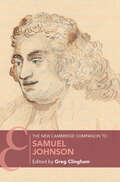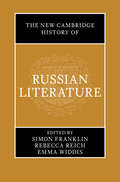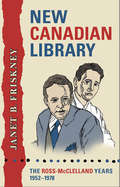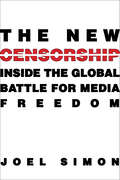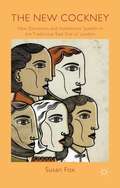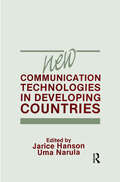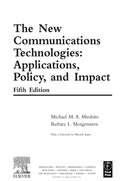- Table View
- List View
New Approaches to William Godwin: Forms, Fears, Futures (Palgrave Studies in the Enlightenment, Romanticism and Cultures of Print)
by Eliza O’Brien Helen Stark Beatrice TurnerThis collection showcases work on William Godwin (1756-1836) foregrounding new critical approaches and uncovering new texts. Godwin is a familiar presence in scholarship on the Shelley-Godwin circle and on Dissenting intellectual circles, but the present collection considers him closely as an author and thinker on his own terms. The range of texts and topics covered by this collection will be of interest both to scholars familiar with Godwin and those approaching his work for the first time.
The New Arthurian Encyclopedia: New edition (Reference Library Of The Humanities #Vol. 931)
by Norris J. Lacy Geoffrey Ashe Sandra Ness Ihle Marianne E. Kalinke Raymond H. ThompsonFirst published in 1996. Now updated with a new information-packed 40-page Supplement covering the years 1990-1995, this unique Encyclopedia highlights the World of King Arthur from its origins in Dark Age Britain to the present day, when Arthurian novels, films, and music continue to appear around the world at an astonishing rate. The Supplement, which provides five full years of coverage not available anywhere else, enhances the usefulness of more than 1,300 entries on all aspects of the Arthurian legend-in literature, history, folklore, archaeology, art, and music. Written by an international team of over 130 authorities, no other work approaches this A-Z guide to the legends of King Arthur and his knights of the Round Table for breadth and depth of coverage. This is the ultimate source for reliable information on topics as diverse as the Grail, Tristan and Isolde, Lancelot and Guenevere, Arthurian operas, the historicity of Arthur, and more.
New Atalantis (Pickering Women's Classics)
by Delarivier ManleyAn early example of satirical political writing by a woman. The book, with its blend of politics and sexuality, is based on the public and private lives of prominent politicians and society figures of the time.
The New Atheist Denial of History
by Borden W. Painter Jr.This compact, forcefully argued work calls Sam Harris, Richard Dawkins, Steven Pinker, and the rest of the so-called 'New Atheists' to account for failing to take seriously the historical record to which they so freely appeal when attacking religion. The popularity of such books as Harris's The End of Faith, Dawkins's The God Delusion, and Christopher Hitchens' God Is Not Great set off a spate of reviews, articles, and books for and against, yet in all the controversy little attention has focused on the historical evidence and arguments they present to buttress their case. This book is the first to challenge in depth the distortions of this New Atheist history. It presents the evidence that the three authors and their allies ignore. It points out the lack of historical credibility in their work when judged by the conventional criteria used by mainstream historians. It does not deal with the debate over theism and atheism nor does it aim to defend the historical record of Christianity or religion more generally. It does aim to defend the integrity of history as a discipline in the face of its distortion by those who violate it.
New Black Feminist Criticism, 1985-2000
by Arlene Keizer M. Giulia Fabi Gloria Bowles Barbara ChristianA passionate and celebrated pioneer in her own words New Black Feminist Criticism, 1985-2000 collects a selection of essays and reviews from Barbara Christian, one of the founding voices in black feminist literary criticism. Published between the release of her second landmark book Black Feminist Criticism and her death, these writings include eloquent reviews, evaluations of black feminist criticism as a discipline, reflections on black feminism in the academy, and essays on Toni Morrison, Alice Walker, Paule Marshall, and others.
New Blazing World and Other Writings
by Kate Lilley"New Blazing World" (1666), is one of the earliest pieces of science fiction, telling the story of a voyage to a Utopian World. The Duchess of Newcastle (1623-73) was fascinated by contemporary science, and wove it into her writings. She was a colourful figure as well as a popular author.
The New Bloomsday Book: A Guide Through Ulysses
by Harry BlamiresSince 1966 readers new to James Joyce have depended upon this essential guide to Ulysses. Harry Blamires helps readers to negotiate their way through this formidable, remarkable novel and gain an understanding of it which, without help, it might have taken several readings to achieve. The New Bloomsday Book is a crystal clear, page-by-page, line-by-line running commentary on the plot of Ulysses which illuminates symbolic themes and structures along the way. It is a highly accessible, indispensible guide for anyone reading Joyce's masterpiece for the first time. To ensure that Blamires' classic work will remain useful to new readers, this third edition contains the page numbering and references to three commonly read editions of Ulysses: the Oxford University Press 'World Classics' (1993), the Penguin 'Twentieth-Century Classics' (1992), and the Gabler 'Corrected Text' (1986) editions.
The New Bloomsday Book: A Guide through Ulysses
by Harry BlamiresThe New Bloomsday Book is a crystal clear, line-by-line running commentary on the plot of James Joyce's Ulysses which illuminates many symbolic themes and literary structures along the way.
New Body Politics: Narrating Arab and Black Identity in the Contemporary United States (Routledge Series on Identity Politics)
by Therí A. PickensIn the increasingly multi-racial and multi-ethnic American landscape of the present, understanding and bridging dynamic cross-cultural conversations about social and political concerns becomes a complicated humanistic project. How do everyday embodied experiences transform from being anecdotal to having social and political significance? What can the experience of corporeality offer social and political discourse? And, how does that discourse change when those bodies belong to Arab Americans and African Americans? Therí A. Pickens discusses a range of literary, cultural, and archival material where narratives emphasize embodied experience to examine how these experiences constitute Arab Americans and African Americans as social and political subjects. Pickens argues that Arab American and African American narratives rely on the body’s fragility, rather than its exceptional strength or emotion, to create urgent social and political critiques. The creators of these narratives find potential in mundane experiences such as breathing, touch, illness, pain, and death. Each chapter in this book focuses on one of these everyday embodied experiences and examines how authors mobilize that fragility to create social and political commentary. Pickens discusses how the authors' focus on quotidian experiences complicates their critiques of the nation state, domestic and international politics, exile, cultural mores, and the medical establishment. New Body Politics participates in a vibrant interdisciplinary conversation about cross-ethnic studies, American literature, and Arab American literature. Using intercultural analysis, Pickens explores issues of the body and representation that will be relevant to fields as varied as Political Science, African American Studies, Arab American Studies, and Disability Studies.
The New Cambridge Companion to: The New Cambridge Companion to William Faulkner
by John T. MatthewsThe New Cambridge Companion to William Faulkner offers contemporary readers a sample of innovative approaches to interpreting and appreciating William Faulkner, who continues to inspire passionate readership worldwide. The essays here address a variety of topics in Faulkner's fiction, such as its reflection of the concurrent emergence of cinema, social inequality and rights movements, modern ways of imagining sexual identity and behavior, the South's history as a plantation economy and society, and the persistent effects of traumatic cultural and personal experience. This new Companion provides an introduction to the fresh ways Faulkner is being read in the twenty-first century, and bears witness to his continued importance as an American and world writer.
The New Cambridge Companion to Coleridge (Cambridge Companions to Literature)
by Tim Fulford Jeffrey W. Barbeau Jeffrey N. Cox Tom Duggett Michael Gamer Nicholas Halmi Kurtis Hessel Felicity James Ewan James Jones Gregory Leadbetter Jacob Lloyd Charles W. Mahoney Thomas Owens Margaret Russett Karen Swann Joanna E. Taylor Alan VardyThis new collection enables students and general readers to appreciate Coleridge's renewed relevance 250 years after his birth. An indispensable guide to his writing for twenty-first-century readers, it contains new perspectives that reframe his work in relation to slavery, race, war, post-traumatic stress disorder and ecological crisis. Through detailed engagement with Coleridge's pioneering poetry, the reader is invited to explore fundamental questions on themes ranging from nature and trauma to gender and sexuality. Essays by leading Coleridge scholars analyse and render accessible his extraordinarily innovative thinking about dreams, psychoanalysis, genius and symbolism. Coleridge is often a direct and gripping writer, yet he is also elusive and diverse. This Companion's great achievement is to offer a one-volume entry point into his incomparably rich and varied world.
The New Cambridge Companion to Herman Melville
by Robert S. LevineThe New Cambridge Companion to Herman Melville provides timely, critical essays on Melville's classic works. The essays have been specially commissioned for this volume and provide a complete overview of Melville's career. Melville's major novels are discussed, along with a range of his short fiction and poetry, including neglected works ripe for rediscovery. The volume includes essays on such new topics as Melville and oceanic studies, Melville and animal studies, and Melville and the planetary, along with a number of essays that focus on form and aesthetics. Written at a level both challenging and accessible, this New Companion brings together a team of leading international scholars to offer students of American literature the most comprehensive introduction available to Melville's art.
The New Cambridge Companion to Joseph Conrad
by J. H. StapeJoseph Conrad's centrality to modern literature is well established. The New Cambridge Companion to Joseph Conrad provides essential guidance to varied developments in the field of Conrad studies since the publication of The Cambridge Companion to Joseph Conrad (1996). The volume's thirteen chapters offer diverse perspectives on emergent areas of interest, including canon formation, postcolonialism, gender, critical reception and adaptation. Likewise, chapters on Conrad's autobiographical writings, Heart of Darkness and 'The Secret Sharer', consider recent trends in both literary and cultural studies. A chronology and an updated guide to further reading serve to provide essential orientation to a large and complex field. This volume is the ideal starting point for students new to Conrad's work as well as for scholars wishing to keep abreast of current issues.
The New Cambridge Companion to Medieval Romance (Cambridge Companions to Literature)
by Roberta L. KruegerThis new Companion provides a broad and perceptive overview of the most important vernacular literary genre of the Middle Ages. Freshly commissioned, original chapters from seventeen leading scholars introduce students and general readers to the form's poetics, narrative voice and manuscript contexts, as well as its relationship to the Mediterranean world, race, gender and the emotions, among many other topics. Providing fresh perspectives on the first pan-European literary movement, essays range across a broad geographical area, including England, France, Italy, Germany and the Iberian Peninsula, as well as a varied linguistic spectrum, including Arabic, Hebrew and Yiddish. Exploring the celebration of chivalric ideals and courtly refinements, the volume excavates the tensions and traumas lying beneath decorous surface appearances. An introduction, bibliography of texts and translations as well as chapter-by-chapter reading lists complete this essential guide.
The New Cambridge Companion to Samuel Beckett
by Dirk Van HulleIn the past decade, there has been an unprecedented upsurge of interest in Samuel Beckett's works. The New Cambridge Companion to Samuel Beckett offers an accessible and engrossing introduction to a key set of issues animating the field of Beckett studies today. This companion considers Beckett's lasting significance by addressing a host of relevant topics. Written by a team of renowned scholars, this volume presents a continuum in Beckett studies ranging from theoretical approaches to performance studies, from manuscript research to the study of bilingualism, intertextuality, late modernism, history, philosophy, ethics, body and mind. The emphasis on burgeoning critical approaches aids the reader's understanding of recent developments in Beckett studies while prompting further exploration, assisted by the guide to further reading.
The New Cambridge Companion to Samuel Johnson (Cambridge Companions to Literature)
by Greg ClinghamStudents, scholars, and general readers alike will find the New Cambridge Companion to Samuel Johnson deeply informed and appealingly written. Each newly commissioned chapter explores aspects of Johnson's writing and thought, including his ethical grasp of life, his views of language, the roots of his ideas in Renaissance humanism, and his skeptical-humane style. Among the themes engaged are history, disability, gender, politics, race, slavery, Johnson's representation in art, and the significance of the Yale Edition. Works discussed include Johnson's poetry and fiction, his moral essays and political tracts, his Shakespeare edition and Dictionary, and his critical, biographical, and travel writing. A narrated Further Reading provides an informative guide to the study of Johnson, and a substantial Introduction highlights how his literary practice, philosophical values, and life experience provide a challenge to readers new and established. Through fresh, integrated insights, this authoritative guide reveals the surprising contemporaneity of Johnson's thought.
The New Cambridge Companion to Shakespeare
by Margreta De Grazia Stanley WellsWritten by a team of leading international scholars, this Companion is designed to illuminate Shakespeare's works through discussion of the key topics of Shakespeare studies. Twenty-one brand new essays provide lively and authoritative approaches to recent scholarship and criticism for readers keen to expand their knowledge and appreciation of Shakespeare. The book contains stimulating chapters on traditional topics such as Shakespeare's biography and the transmission of his texts. Individual readings of the plays are given in the context of genre as well as through the cultural and historical perspectives of race, sexuality and gender, and politics and religion. Essays on performance survey the latest digital media as well as stage and film. Throughout the volume, contributors discuss Shakespeare in a global as well as a national context, a dramatist with a long and constantly mutating history of reception and performance.
The New Cambridge Companion to T. S. Eliot: T. S. Eliot
by Jason HardingDrawing on the latest developments in scholarship and criticism, The New Cambridge Companion to T. S. Eliot opens up fresh avenues of appreciation and inquiry to a global twenty-first century readership. Emphasizing major works and critical issues, this collection of newly commissioned essays from leading international scholars provides seven full chapters reassessing Eliot's poetry and drama; explores important contemporary critical issues that were previously untreated, such as the significance of gender and sexuality; and challenges received accounts of his at times controversial critical reception. Complete with a chronology of Eliot's life and work and an up-to-date select bibliography, this authoritative and accessible introduction to Eliot's complete oeuvre will be an essential resource for students.
The New Cambridge History of Russian Literature
by Simon Franklin Rebecca Reich Emma WiddisThis is the essential new guide to Russian literature, combining authority and innovation in coverage ranging from medieval manuscripts to the internet and social media. With contributions from thirty-four world-leading scholars, it offers a fresh approach to literary history, not as one integral narrative but as multiple parallel histories. Each of its four strands tells a story of Russian literature according to a defined criterion: Movements, Mechanisms, Forms and Heroes. At the same time, six clusters of shorter themed essays suggest additional perspectives and criteria for further study and research. In dialogue, these histories invite a multiplicity of readings, both within and across the narrative strands. In an age of shifting perspectives on Russia, and on national literatures more widely, this open but easily navigable volume enables readers to engage with both traditional literary concerns and radical re-conceptualisations of Russian history and culture.
New Canadian Library
by Janet FriskneyIn the mid-1950s, much Canadian literature was out of print, making it relatively inaccessible to readers, including those studying the subject in schools and universities. When English professor Malcolm Ross approached Toronto publisher Jack McClelland in 1952 to propose a Canadian literary reprint series, it was still the accepted wisdom among publishers that Canadian literature was of insufficient interest to the educational market to merit any great publishing risks. Eventually convinced by Ross that a latent market for Canadian literary reprints did indeed exist, McClelland & Stewart launched the New Canadian Library (NCL) series in 1958, with Ross as its general editor. In 2008, the NCL will celebrate a half-century of publication.In New Canadian Library, Janet B. Friskney takes the reader through the early history of the NCL series, focusing on the period up to 1978 when Malcolm Ross retired as general editor. A wealth of archival resources, published reviews, and the NCL volumes themselves are used to survey the working relationship between Ross and McClelland, as well as the collaborative participation of those who, through the middle decades of the twentieth century, were committed to studying and nurturing Canada's literary heritage. To place the New Canadian Library in its proper historical context, Friskney examines the simultaneous development of Canadian literary studies as a legitimate area of research and teaching in academe and acknowledges the NCL as a milestone in Canadian publishing history.
The New Censorship: Inside the Global Battle for Media Freedom (Columbia Journalism Review Books)
by Joel SimonJournalists are being imprisoned and killed in record numbers. Online surveillance is annihilating privacy, and the Internet can be brought under government control at any time. Joel Simon, the executive director of the Committee to Protect Journalists, warns that we can no longer assume that our global information ecosystem is stable, protected, and robust. Journalists are increasingly vulnerable to attack by authoritarian governments, militants, criminals, and terrorists, who all seek to use technology, political pressure, and violence to set the global information agenda.Reporting from Pakistan, Russia, Turkey, Egypt, and Mexico, among other hotspots, Simon finds journalists under threat from all sides. The result is a growing crisis in information—a shortage of the news we need to make sense of our globalized world and fight human rights abuses, manage conflict, and promote accountability. Drawing on his experience defending journalists on the front lines, he calls on "global citizens," U.S. policy makers, international law advocates, and human rights groups to create a global freedom-of-expression agenda tied to trade, climate, and other major negotiations. He proposes ten key priorities, including combating the murder of journalists, ending censorship, and developing a global free-expression charter to challenge the criminal and corrupt forces that seek to manipulate the world's news.
The New Censorship: Inside the Global Battle for Media Freedom (Columbia Journalism Review)
by Joel SimonAn examination of how the media is under fire and how to safeguard journalists and the information they seek to share with the public.Journalists are being imprisoned and killed in record numbers. Online surveillance is annihilating privacy, and the Internet can be brought under government control at any time. Joel Simon, the executive director of the Committee to Protect Journalists, warns that we can no longer assume that our global information ecosystem is stable, protected, and robust. Journalists are increasingly vulnerable to attack by authoritarian governments, militants, criminals, and terrorists, who all seek to use technology, political pressure, and violence to set the global information agenda.Reporting from Pakistan, Russia, Turkey, Egypt, and Mexico, among other hotspots, Simon finds journalists under threat from all sides. The result is a growing crisis in information—a shortage of the news we need to make sense of our globalized world and fight human rights abuses, manage conflict, and promote accountability. Drawing on his experience defending journalists on the front lines, he calls on &“global citizens,&” U.S. policy makers, international law advocates, and human rights groups to create a global freedom-of-expression agenda tied to trade, climate, and other major negotiations. He proposes ten key priorities, including combating the murder of journalists, ending censorship, and developing a global free-expression charter to challenge the criminal and corrupt forces that seek to manipulate the world's news.&“Wise and insightful. [Simon] offers hope to all who care about maintaining the free flow of information in a world full of would-be censors.&”—Ann Cooper, Columbia Journalism School
The New Cockney
by Susan FoxThe New Cockney provides a sociolinguistic account of speech variation among adolescents in the 'traditional' East End of London. The study takes account of the social and economic upheaval in the area since the 1950s, primarily concentrating on factors such as the immigration of the Bangladeshi community and its effect on the Cockney dialect. By paying attention to the particular, this book contributes to a better understanding of the more general concerns of linguistic variation. With a focus on the interaction and social practices of a group of adolescents attending a youth centre, the study highlights some of the possible mechanisms for language change.
New Communication Technologies in Developing Countries: New Communication Technologies In Developing Countries (Routledge Communication Series)
by Jarice Hanson Uma NarulaThis volume explores how a number of developing countries -- including India, Malaysia, Columbia, Brazil, and Saudi Arabia -- are responding to the pressures of the information society. Infrastructural development, policies, and social systems are investigated, and models of information technologies and society are proposed in order to better reference the differences and similarities among the nations profiled. The authors identify the social technology perspective via the assimilation of technology in lifestyles and social systems. From this perspective, the diffusion of technologies is analyzed with a critical eye for theories of culture lag, diffusion and innovation, and technological determinism and liberalism. The social perspective is a new addition to development studies, and the reader may see how, as the global information society comes into focus, the social dimensions are more important than some theorists originally envisioned.
The New Communications Technologies: Applications, Policy, and Impact
by Barbara Morgenstern Michael MirabitoAs new communications applications are developed and brought to market, it is vital for communications professionals to keep abreast of these issues. Since the technologies and applications also affect our daily lives, it is important to understand how they will shape the country and, by extension, the world at large. International censorship, the impact of the Internet and wireless tools, and th legisation following the World Trade Center bombing all fall into this category.The New Communications Technologies, Fifth Edition, provides vital information on the new and emerging technologies that will shape the way communicators do business. The book explores the new communications technologies and covers topics ranging from multimedia and production to satellites to digital communication. Just as important, the book examines the social, economic, and political impact brought about by the adoption of such technologies and applications; this fallout includes privacy concerns, First Amendment issues, and the implications raised by biometric systems.
